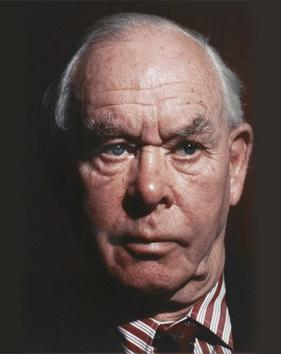John Bowlby
John Bowlby
John Bowlby (26 February 1907 – 2 September 1990) was a British psychologist, psychiatrist, and psychoanalyst, notable for his interest in child development and for his pioneering work in the development of attachment theory. He is considered one of the most influential figures in the field of developmental psychology.
Early Life and Education[edit | edit source]
John Bowlby was born in London, England, into an upper-middle-class family. He was the fourth of six children. Bowlby was educated at the Royal Naval College, Dartmouth and later attended Trinity College, Cambridge, where he studied pre-clinical sciences. He then went on to study medicine at University College Hospital in London.
Career[edit | edit source]
Bowlby's career began in the 1930s when he worked at the London Child Guidance Clinic. His experiences there, particularly with children who had been separated from their families, led him to develop an interest in the effects of early separation on child development. During World War II, Bowlby served in the Royal Army Medical Corps and worked with children who had been evacuated from their homes.
After the war, Bowlby worked at the Tavistock Clinic in London, where he continued his research on child development. His work was heavily influenced by his collaboration with Mary Ainsworth, who conducted empirical studies that supported and expanded upon his theories.
Attachment Theory[edit | edit source]
Bowlby's most significant contribution to psychology is his development of attachment theory. This theory posits that children are biologically predisposed to develop attachments to caregivers as a means of survival. Bowlby identified four phases of attachment development: pre-attachment, attachment-in-the-making, clear-cut attachment, and formation of reciprocal relationships.
Attachment theory has had a profound impact on the understanding of child development and has influenced practices in childcare, education, and mental health.
Major Works[edit | edit source]
Some of Bowlby's most influential works include:
- Attachment and Loss (1969-1980) - A trilogy that outlines his attachment theory.
- Maternal Care and Mental Health (1951) - A report for the World Health Organization that emphasized the importance of a child's relationship with their mother.
Legacy[edit | edit source]
John Bowlby's work has left a lasting legacy in the fields of psychology, psychiatry, and social work. His theories continue to be a foundation for research and practice in understanding the importance of early relationships in human development.
See Also[edit | edit source]
References[edit | edit source]
External Links[edit | edit source]
Search WikiMD
Ad.Tired of being Overweight? Try W8MD's physician weight loss program.
Semaglutide (Ozempic / Wegovy and Tirzepatide (Mounjaro / Zepbound) available.
Advertise on WikiMD
|
WikiMD's Wellness Encyclopedia |
| Let Food Be Thy Medicine Medicine Thy Food - Hippocrates |
Translate this page: - East Asian
中文,
日本,
한국어,
South Asian
हिन्दी,
தமிழ்,
తెలుగు,
Urdu,
ಕನ್ನಡ,
Southeast Asian
Indonesian,
Vietnamese,
Thai,
မြန်မာဘာသာ,
বাংলা
European
español,
Deutsch,
français,
Greek,
português do Brasil,
polski,
română,
русский,
Nederlands,
norsk,
svenska,
suomi,
Italian
Middle Eastern & African
عربى,
Turkish,
Persian,
Hebrew,
Afrikaans,
isiZulu,
Kiswahili,
Other
Bulgarian,
Hungarian,
Czech,
Swedish,
മലയാളം,
मराठी,
ਪੰਜਾਬੀ,
ગુજરાતી,
Portuguese,
Ukrainian
Medical Disclaimer: WikiMD is not a substitute for professional medical advice. The information on WikiMD is provided as an information resource only, may be incorrect, outdated or misleading, and is not to be used or relied on for any diagnostic or treatment purposes. Please consult your health care provider before making any healthcare decisions or for guidance about a specific medical condition. WikiMD expressly disclaims responsibility, and shall have no liability, for any damages, loss, injury, or liability whatsoever suffered as a result of your reliance on the information contained in this site. By visiting this site you agree to the foregoing terms and conditions, which may from time to time be changed or supplemented by WikiMD. If you do not agree to the foregoing terms and conditions, you should not enter or use this site. See full disclaimer.
Credits:Most images are courtesy of Wikimedia commons, and templates, categories Wikipedia, licensed under CC BY SA or similar.
Contributors: Prab R. Tumpati, MD

